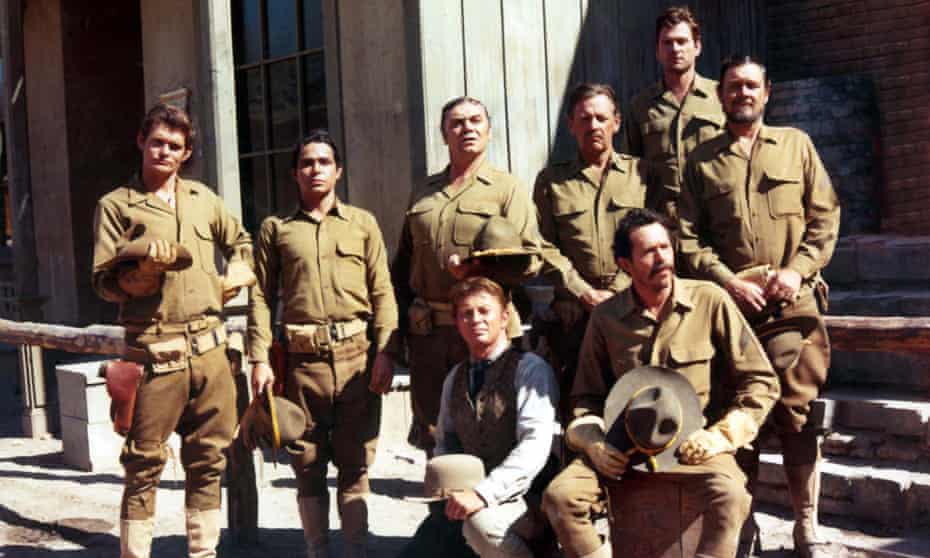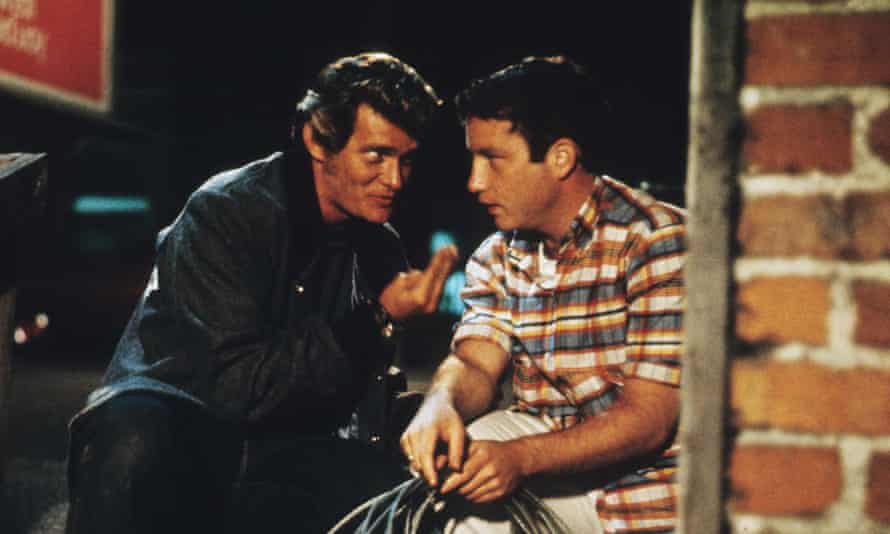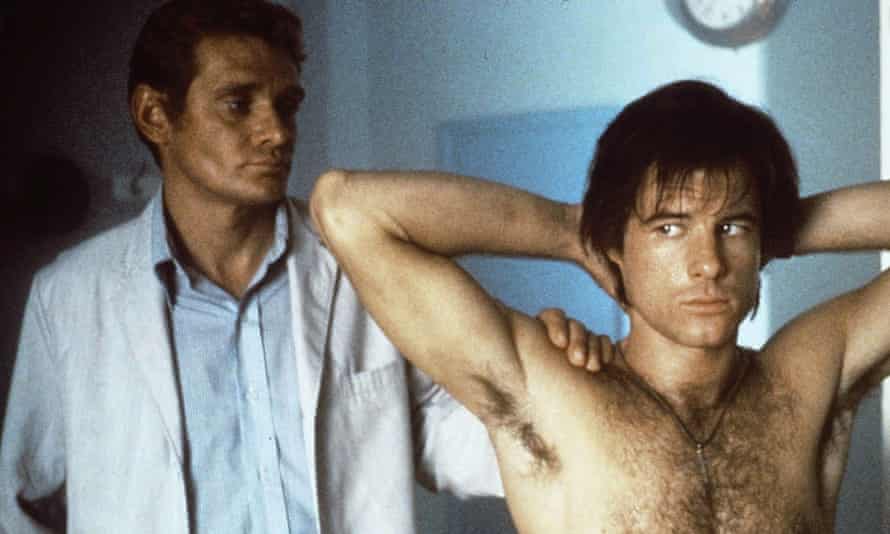

Bo Hopkins
Bo Hopkins was born in 1942 in Greenville, South Carolina. An appealing character actor he has featured in mmany Westerns and gang films and television series. Films include “The Wild Bunch” in 1969, “The Getaway” and “Midnight Express”. He had recurring roles in both “The Rockford Files” with James Garner and as Matthew Blaisdale in “Dynasty”.
TCM Overview:
Bo Hopkins’ acting background started at the infamous Desilu Playhouse under the guidance of Uta Hagen. His first major film acting role was in the western classic The Wild Bunch (1969) with acclaimed director Sam Peckinpah playing opposite the likes of a few other Hollywood notables – Ernest Borgnine, William Holden and Edmond O’Brien. From there his career was on the fast track to stardom. He gave a memorable performance in the Universal Pictures film AMERICAN GRAFFITI (1973) playing the role as the intimidating leader of the Pharaohs and he continues to amass notoriety for his clever portrayal still today.
With over one hundred acting credits to his name, Bo Hopkins continues to draw in the crowds when he finds time in his active schedule to make it to a select few car shows around the country. Always one to grant a photo op or sign an autograph for admirers of his work, he remains humble in his success.
Bo Hopkins obituary in 20222.
Character actor who specialised in a combination of good ol’ boy affability and latent violence

Bo Hopkins, who has died aged 84, established his credentials as a character actor early in his film career. But he was already 31 when, in The Wild Bunch(1969), his third film role, he played Crazy Lee, left behind by the gang with their hostages as they escape an ambush. His glee as he marches the terrified captives around at gunpoint singing Shall We Gather at the River? highlighted the violent absurdity of the director Sam Peckinpah’s opening scene. In American Graffiti (1973), directed by George Lucas, he played the leader of a greaser gang, the Pharoahs, who frightens Richard Dreyfuss’s strait-laced Curt into pulling off a spectacular prank on the police. His reward, Hopkins tells him with a wily grin, will be membership of the Pharoahs, complete with “car coat and blood initiation”.
This combination of good ol’ boy affability and latent violence came to define Hopkins’s presence in more than 100 films and television roles, typecasting he escaped only occasionally, most notably perhaps in the soap Dynasty. His recurring part in this, as the geologist Matthew Blaisdel – former lover of Krystle Carrington (Linda Evans), and married to Claudia, who is having an affair with Blake Carrington’s son – was crucial enough for him to be brought back after being written out of the show.
His younger life may have prepared him for such roles. He was born in Greenville, South Carolina, named William, and adopted by Johnnie Hopkins, a mill worker, and his wife. But Johnnie died of a heart attack on the family’s front porch in front of Billy, then aged nine, and his mother, who dragged him inside trying to revive him. He lived with his mother and maternal grandparents, but when his mother remarried, he rebelled against his stepfather and returned to his grandparents. Having learned of his adoption, he met his birth mother and half-siblings.

A delinquent teenager, at 17 he enlisted in the US army rather than be sent to reform school. He served in the 101st Airborne Division and after his discharge returned to Greenville, where he married Norma Woodle and in 1960 had a daughter, Jane.
His wife disagreed with his desire to pursue acting and left, taking their daughter; they divorced in 1962. He played in a local production of The Teahouse of the August Moon and won a scholarship for summer stock at the Pioneer Playhouse in Danville, Kentucky. “I didn’t even know what summer stock was,” he recalled. After his season, he went to New York, and was playing in an off-Broadway production of Bus Stop, when the producer wanted him to change his name. He took the name Bo from his character.
He moved to Los Angeles, attending classes at the Actors Studio, and won another scholarship, to Desilu-Cahuenga Studios (now Red Studios Hollywood), where he studied under Uta Hagen. His first television role came in 1966 on the Phyllis Diller Show, a comedy, followed by three westerns and the Andy Griffith Show. In some ways he resembled Griffith, an easy-going character with a dark side, which Griffith had demonstrated so well in A Face in the Crowd (1957).
His break in The Wild Bunch came not through TV, but because William Holden saw him on stage in Picnic, and recommended him to Peckinpah. His next part was in an underrated war film, The Bridge at Remagen (1969). He went back to South Carolina and took his mother and grandmother to see it, and The Wild Bunch, and recalled how “everyone who said I was gonna end up in prison said they always knew Billy was gonna make something of himself”.

Parts followed in interesting movies including Monte Walsh (1970), The Moonshine War (1970) and The Culpepper Cattle Co (1972), roles that Slim Pickens or Jack Elam might once have filled. Peckinpah cast him again in The Getaway (1972) as the robber double-crossed by Al Lettieri before Lettieri tries the same on Steve McQueen. In White Lightning (1973) he was the moonshiner whom Burt Reynolds chases.
His turn in American Graffiti landed him a recurring role in the TV series Doc Elliot, and by 1975 he seemed on the verge of a breakthrough, with substantial roles in The Day of the Locust and Peckinpah’s The Killer Elite, an eye-catching part as a would-be gangster dressed as a cowboy in Robert Mulligan’s off-beat Nickel Ride, and playing Pretty Boy Floyd in a TV movie, The Kansas City Massacre. Soon, however, his career’s pattern was set: he played Jim Rockford’s lawyer in The Rockford Files, but his bigger parts were in lesser films or TV movies; his engaging turns came in bigger films, for instance playing the mysterious Tex, who ensures Brad Davis is sent to prison, in Alan Parker’s Midnight Express (1978).
Hopkins became enough of a cult figure that Quentin Tarantino cast him in a leading role as a sheriff in the early straight-to-video From Dusk Till Dawn 2 (1999). His final appearance came in Hillbilly Elegy (2020), directed by his American Graffiti co-star Ron Howard.
Hopkins is survived by his second wife, Sian Green, whom he married in 1989, their son, Matthew, and his daughter, Jane.
Bo (William Mauldin) Hopkins, actor, born 2 February 1938; died 28 May 2022Bo

